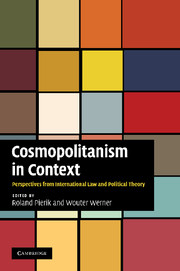1 - Cosmopolitanism in context: an introduction
Published online by Cambridge University Press: 06 December 2010
Summary
This book deals with the strained relationship between cosmopolitanism as a moral standard and the real existing institutions in which cosmopolitan ideals are to be implemented.
Cosmopolitanism is an age-old normative ideal which contends that all kosmopolitês, all citizens of the world, share a membership in one single community, the cosmopolis, which is governed by a universal and egalitarian law. Martha Nussbaum describes such cosmopolitans as persons “whose primary allegiance is to the worldwide community of human beings.” This cosmopolitan notion of a common humanity translates normatively into the idea that we have moral duties towards all human beings since “every human being has a global stature as the ultimate unit of moral concern.” From ancient philosophy onwards, the cosmopolis has been portrayed as a perfect order, guided by divine or natural reason, and contrasted to actual men-ruled polises that were failing ideals of justice and law. Cicero, for example, described true cosmopolitan law as:
right reason in agreement with nature; it is of universal application, unchanging and everlasting; it summons to duty by its commands, and averts from wrongdoing by its prohibitions … We cannot be freed from its obligations by senate or people, and we need not look outside ourselves for an expounder or interpreter of it.
In similar fashion, some contemporary cosmopolitan thinkers seek to ground cosmopolitanism on naturalist arguments, albeit with slight modifications and variations.
Information
- Type
- Chapter
- Information
- Cosmopolitanism in ContextPerspectives from International Law and Political Theory, pp. 1 - 16Publisher: Cambridge University PressPrint publication year: 2010
References
Accessibility standard: Unknown
Why this information is here
This section outlines the accessibility features of this content - including support for screen readers, full keyboard navigation and high-contrast display options. This may not be relevant for you.Accessibility Information
- 3
- Cited by
